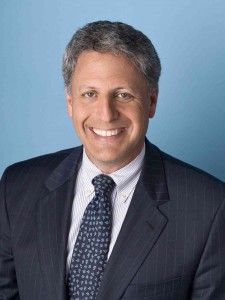 The revolving door at the top office of National Public Radio keeps spinning. Tuesday current CEO Gary Knell announced that he is resigning this fall to take over the much-bigger National Geographic, for about twice as much salary. Knell has been on the job at NPR for fewer than two years, and is largely credited to bringing some stability to the public broadcaster after the more tumultuous reign of Vivian Schiller who was widely criticized by the right for firing Juan Williams and off-the-cuff critical remarks about the Tea Party made by her development director.
The revolving door at the top office of National Public Radio keeps spinning. Tuesday current CEO Gary Knell announced that he is resigning this fall to take over the much-bigger National Geographic, for about twice as much salary. Knell has been on the job at NPR for fewer than two years, and is largely credited to bringing some stability to the public broadcaster after the more tumultuous reign of Vivian Schiller who was widely criticized by the right for firing Juan Williams and off-the-cuff critical remarks about the Tea Party made by her development director.
NPR is still running a deficit of $6 million for the current fiscal year, though Knell says he and the board of directors have been working on a strategic plan to bring about a balanced budget by 2015.
Both Knell and NPR’s board chair Kit Jensen have made strong assurances that there are no concerns with Knell’s performance, and that they are all still very much in love. Knell just wants to go head up a much bigger organization, for more money.
It’s difficult to know what this means for NPR, especially since the resignation came as a surprise and there is no successor lined up. The network just debuted a new streamlined and more mobile-friendly website last week, further cementing the organization’s success with web-oriented content.
However, that success is also responsible for tension with affiliates who often feel that NPR’s web presence circumvents local stations. To help address this issue the new site highlights a viewer’s local member station at the top of the page, sharing equal billing with NPR, along with a prominent link to that station’s live stream.
While liturgical Republican attacks on the network are at a low point in the cycle, the next CEO will have to be someone who can navigate the regular calls to defund public broadcasting, pretty much regardless of what NPR actually airs. For the public radio listening public the risk is always that this will push network leadership to be more conservative in its outlook to circumvent accusations of being too liberal.
Knell’s record on this count is mixed. Fairness and Accuracy in Reporting took him to task early in his term for comments saying he wanted to “depoliticize” the debate over public radio. Janine Jackson read his comments as “code for appeasing public broadcasting’s conservative enemies by adding more right-wing content and censoring things they might not like.” I will be curious to read FAIR’s take on Knell’s exit and his short record.
NPR’s own breaking news blog the two-way pretty much broke the Knell resignation story yesterday, and also reprints Knell’s resignation letter to NPR staff.


